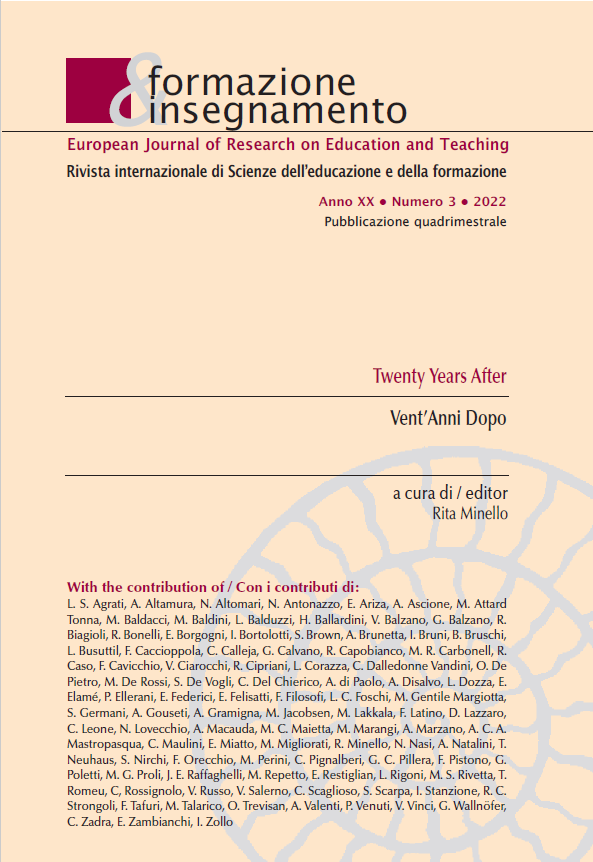Professional development and teachers' training: Analysis of some European educational reports
DOI:
https://doi.org/10.7346/-fei-XX-03-22_41Palavras-chave:
teachers' professional development, competencies, European educational reportsResumo
The development of the teachers’ expertise and competences is a strategic dimension for schools, in terms of equity and quality. However, to take on this challenge there is an urgent need to invest in continuous teachers’ training, in order to acquire those key competences required at European level. Starting from these elements, the paper reflects on the main dimensions of teachers’ continuing professional development by comparing the Eurydice’s Teachers in Europe: Careers, Development and Well-being report’s data, with those on teachers’ practices and perceptions emerging from the Teaching and Learning International Survey (TALIS) by OECD.
Referências
Alberici, A. (2002). Imparare sempre nella società della conoscenza. Milano: Pearson.
Angrist, J. D., & Lavy, V. (2001). Does Teacher Training Affect Pupil Learning? Evidence from Matched Comparisons in Jerusalem Public Schools. Journal of Labor Economics, 19(2), 343–369. https://doi.org/10.1086/319564
Biesta, G., Priestley, M. & Robinson, S. (2015). The Role of Beliefs in Teacher Agency. Teachers and Teaching, 21(6), 624–640. https://doi.org/10.1080/13540602.2015.1044325
Bocci, F. (2019b). Politiche scolastiche per l’inclusione. In G. Elia, S. Polenghi, & V. Rossini (Eds.), La scuola tra saperi e valori etico-sociali. Politiche culturali e pratiche educative (pp. 545–559). Lecce: Pensa Multimedia.
Carr, D. (2003). Making Sense of Education: An Introduction to the Philosophy and Theory of Education and Teaching, London and New York: Routledge.
Darling-Hammond, L. (2017). Teacher education around the world: What can we learn from international practice?. European Journal of Teacher Education, 40(3), 291–309. https://doi.org/10.1080/02619768.2017.1315399
Darling-Hammond, L., Holtzman, D. J., Gatlin, S. J., & Heilig, J. V. (2005). Does teacher preparation matter? Evidence about teacher certification, Teach for America, and teacher effectiveness. Education Policy Analysis Archives, 13(42), 1–48. https://doi.org/10.14507/epaa.v13n42.2005
Desimone, L. M. (2009). Improving impact studies of teachers’ professional development: Toward better conceptualizations and measures. Educational researcher, 38(3), 181–199. https://doi.org/10.3102/0013189X08331140
Consiglio dell’Unione Europea. (2020a). Conclusioni del Consiglio sull’alfabetizzazione mediatica in un mondo in continua evoluzione 2020/C 193/06 (ST/8274/2020/INIT, Document 52020XG0609(04)). OJ C 193, 9.6.2020, 23–28. Retrieved September 30, 2022, from https://eur-lex.europa.eu/legal-content/IT/TXT/?uri=CELEX:52020XG0609(04)
Consiglio dell’Unione Europea. (2020b). Conclusioni del Consiglio sul contrasto alla crisi COVID-19 nel settore dell’istruzione e della formazione 2020/C 212 I/03 (ST/8610/2020/INIT, Document 52020XG0626(01)). OJ C 212I, 26.6.2020, 9–14. Retrieved September 30, 2022, from https://eur-lex.europa.eu/legal-content/IT/TXT/?uri=CELEX:52020XG0626(01)
Consiglio dell’Unione Europea. (2021). Risoluzione del Consiglio su un quadro strategico per la cooperazione europea nel settore dell’istruzione e della formazione verso uno spazio europeo dell’istruzione e oltre (2021-2030) 2021/C 66/01 (Document 32021G0226(01)). OJ C 66, 26.2.2021, 1–21. Retrieved September 30, 2022, from https://eur-lex.europa.eu/legal-content/IT/TXT/?uri=CELEX:32021G0226(01)
European Commission/EACEA/Eurydice. (2021). Teachers in Europe: Careers, Development and Well-being. Eurydice report. Luxembourg: Publications Office of the European Union. Retrieved September 30, 2022, from https://eurydice.eacea.ec.europa.eu/publications/teachers-europe-careers-development-and-well-being
Hattie, J. (2009). Visible Learning: A Synthesis of over 800 Meta-Analyses Relating to Achievement. London: Routledge.
Hill, H. C., Beisiegel, M., & Jacob, R. (2013). Professional development research: Consensus, crossroads, and challenges. Educational researcher, 42(9), 476–487. https://doi.org/10.3102/0013189x13512674
Jensen, B., Sonnemann, J., Roberts-Hull, K., & Hunter, A. (2016). Beyond PD: Teacher Professional Learning in High-Performing Systems. Washington, DC, USA: National Center on Education and the Economy.
Magnoler, P. (2018). Lo sviluppo professionale degli insegnanti in Italia. Un nuovo cammino fra slanci e discontinuità. In M. Sibilio, & P. Aiello (eds.). Lo sviluppo professionale dei docenti. Ragionare di agentività per una scuola inclusiva (pp. 123-132). Napoli: EdiSES.
OCSE (2019). TALIS 2018 Results (Vol. 1): Teachers and School Leaders as Lifelong Learners. Paris: OECD Pu-blishing. https://doi.org/10.1787/1d0bc92a-en
Rivkin, S. G., Hanushek, E. A., & Kain, J. F. (2005). Teachers, schools, and academic achievement. Econometrica, 73(2), 417–458. https://doi.org/10.1111/j.1468-0262.2005.00584
Rockoff, J. E. (2004). The Impact of Individual Teachers on Student Achievement: Evidence from Panel Data. American Economic Review, 94(2), 247–252. https://doi.org/10.1257/0002828041302244
Skolverket (2014), Research for Classrooms. Scientifc Knowledge and Proven Experience in Practice. Stockholm: Skolverket.
Yoon, K. S., Duncan, T., Lee, S. W. Y., Scarloss, B., & Shapley, K. (2007). Reviewing the evidence on how teacher professional development affects student achievement (Issues & Answers Report, REL 2007 – No. 033). Washington, DC, USA: U.S. Department of Education, Institute of Education Sciences, National Center for Education Evaluation and Regional Assistance, Regional Educational Laboratory Southwest. Retrieved September 30, 2022, from http://ies.ed.gov/ncee/edlabs/projects/project.asp?ProjectID=70
Downloads
Publicado
Como Citar
Edição
Seção
Licença
Copyright (c) 2022 Stefania Nirchi

Este trabalho está licenciado sob uma licença Creative Commons Attribution 4.0 International License.
Formazione & insegnamento é distribuído sob a Attribution 4.0 International (CC BY 4.0).
Para obter mais detalhes, consulte nossa Política de Repositório e Arquivamento, bem como nossos Termos de Direitos Autorais e Licenciamento.





